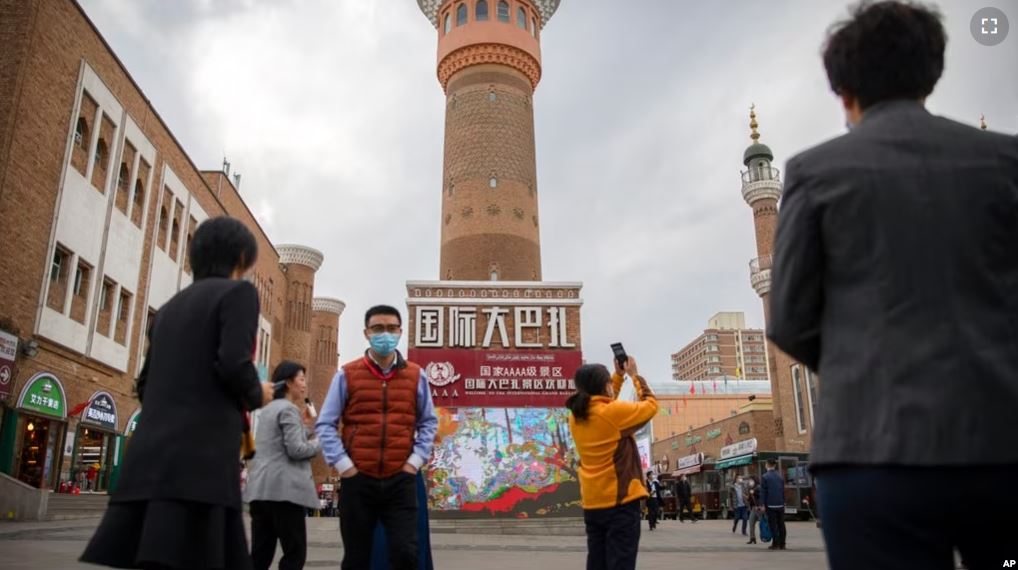Uyghur Americans Press Detainee, Rights Concerns at Biden-Xi Summit
At the Biden-Xi summit, Uyghur Americans like Ziba Murat emphasized the need for a resolution regarding detained relatives in China, urging China to release innocent family members. Despite these efforts, concerns persist about human rights taking a back seat in diplomatic discussions, although President Joe Biden raised these issues during the summit. Uyghur Americans have expressed fears of transnational repression and are calling for proactive U.S. government action.
Uyghur Filmmaker's Trial Paused in China
Uyghur filmmaker Ikram Nurmehmet, accused of "separatism" and "terrorism," and four associates have been on trial in Xinjiang. They were accused of having ties to Uyghur separatist groups. While his friends admitted guilt, Nurmehmet denied charges of recruiting and fundraising for an East Turkistan group in Turkey, and he also told the court he'd been tortured into falsely confessing to crimes he didn't commit. The trial, initially set to conclude, was postponed to January because of the torture claim.
Probe: Forced Uyghur Labor Helped Supply Seafood to US Programs
Chinese distant-water fishing ships employ forced Uyghur and North Korean labor in seafood processing plants, supplying goods to the U.S. military and school lunches, a probe said. The Outlaw Ocean Project's investigation revealed violations of the Uyghur Forced Labor Prevention Act, with over $50 million worth of salmon reaching federally funded programs, $140 million worth of seafood sent to U.S. military bases, and over $300,000 worth of canned pink salmon donated to Ukraine, some sourced from Chinese plants using forced Uyghur labor.
Electronics Exports Get Closer US Scrutiny Over Uyghur Labor Concerns
U.S. scrutiny on electronics, mainly from Malaysia and Vietnam, has heightened because of a U.S. law targeting forced Uyghur labor in Xinjiang. Since June 2022, over 6,000 shipments worth $2 billion have faced controls, with $82 million in electronics rejected or inspected in September alone. Malaysia and Vietnam, major exporters, have seen $320 million worth of cargoes denied or checked, nearly three times more than China. The impact of compliance issues on shipment delays remains unclear.
Uyghur Educator Dies in Xinjiang Prison Amid Torture Allegations
Uyghur educator, researcher and poet Abdusemet Rozi, 57, has died in Xinjiang prison after falling ill, according to Radio Free Asia. Jailed for the second time in 2022, the reason for his arrest remains undisclosed. Authorities buried his body immediately and said he died of illness, but Norway-based Uyghur activist Abduweli Ayup alleges Rozi suffered physical and mental torture. Previously sentenced to 20 years in 2019, released in 2021, and rearrested in 2022, Rozi's arrests are of unknown cause. Ayup suggests his research and social activities, including an article on Uyghur language teaching, might be reasons for detention. Rozi, a 1987 graduate of Kashgar Pedagogical Institute, worked as a teacher and researcher in Xinjiang.
China's Mosque Closures Expand Beyond Uyghur Region
Chinese officials have expanded their campaign of mosque closures to regions other than Xinjiang, where for years it has been blamed for persecuting Muslim minorities, according to a Human Rights Watch report released Wednesday. The U.S.-based rights watchdog calls the crackdown on mosques a violation of religious freedom, constituting a systematic effort to curb Islam in China. China’s Foreign Ministry defends the measures, emphasizing mosque protection and urging against ideological bias and political manipulation.
News in brief
The U.S. decision to lift sanctions on the Chinese Ministry of Public Security's Institute of Forensic Science in Beijing, aimed at stemming the flow of illegal fentanyl from China, has sparked concerns. Last week, the IFS was removed from the U.S. Entity List, prompting worries about implications for national security and human rights. While the State Department clarified that delisting does not constitute removal of sanctions, critics are voicing fears over IFS genetic research targeting Uyghurs. China explained the move as a counternarcotics effort.
Quote
“Lifting sanctions will allow [the IFS] to continue its efforts unhindered, including access to Western genetic analysis technologies and research cooperation. It is important to understand that the institute’s efforts have relied on Western technologies, including U.S.-made Thermo Fisher sequencing equipment and Illumina sequencing equipment, as well as Dutch-German-made Qiagen testing kits in its efforts to target Uyghurs, Tibetans and other PRC Indigenous peoples.” — Mark Munsterhjelm, assistant professor, University of Windsor, and author of Forensic Colonialism: Genetics and the Capture of Indigenous Peoples

